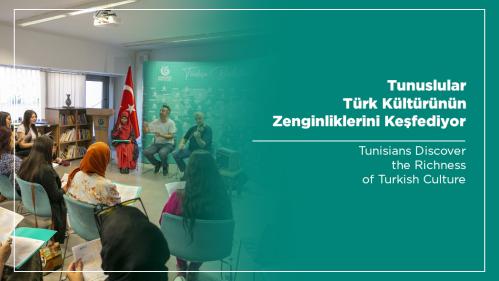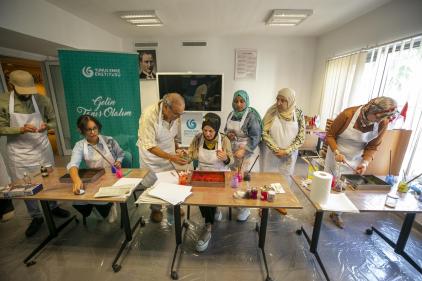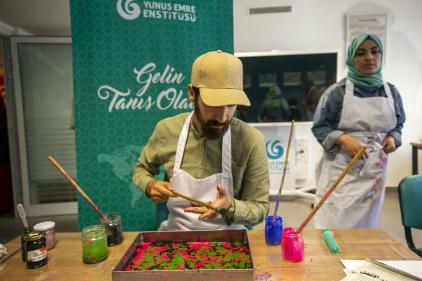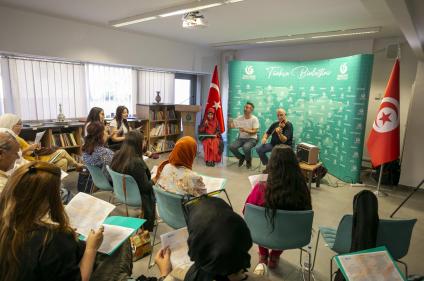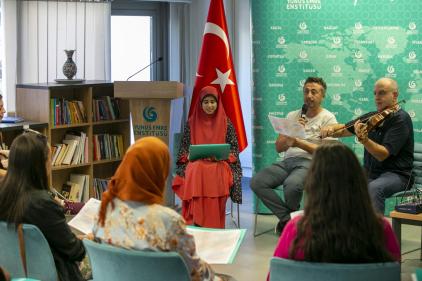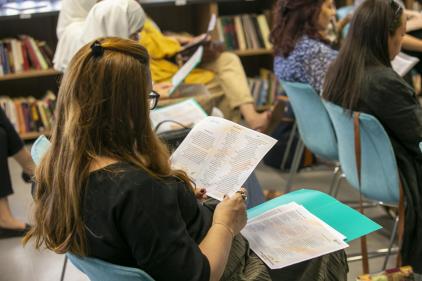Tunisians Discover the Richness of Turkish Culture
Tunisia Yunus Emre Institute continues to make Turkish culture and Turkish the center of attention in Tunisia with various activities carried out to promote Türkiye's rich cultural values.
The institute brings together a large number of Tunisians with the various courses it organizes, from traditional Turkish handicrafts to the promotion of Turkish music.
Stating that she learned the art of marbling in Istanbul and made efforts to introduce this unique art in which water dances with colors in Tunisia, "I am a marbling instructor at Yunus Emre Institute. Many of our trainees from different age and professional groups learn the subtleties of the art of marbling here," said Tunisian artist Zehra Zerruki, marbling instructor at Tunisia Yunus Emre Institute.
Manel Gabsi Murad, who attended courses from the city of Hammamat, 60 kilometers south of the capital Tunisia, stated that he was interested in painting and carried out artistic activities in his workshop in Hammamat.
Telling that he applied as soon as he learned that the marbling course would be organized from the social media account of Tunisia Yunus Emre Institute, “In the course, we both learn the traditional Turkish handicraft in all its intricacies and have a great time. I would like to thank Yunus Emre Institute for providing such an opportunity,” Murad said.
“There is no place in Tunisia where the art of marbling is taught. I was very happy when I heard that Tunisia Yunus Emre Institute would start marbling courses. After starting the course, I discovered the side of marbling art that appeals to the human soul," another trainee, Eyüp Kasımi said.
Tunisia Mennuba University Turkish Language Instructor Dr. Maksut Yıldıran who supported the courses underlined that, in addition to the Turkish courses organized by the Institute, Turkish speaking clubs and artistic events that provide Tunisian trainees with the opportunity to practice paved the way for intense interest in Turkish in Tunisia.
Pointing out that Turkish music is also attracted by Tunisians, “I am in a music group consisting of Tunisians. I also join the music club upon the invitation of the institute. As you know, music unites cultures. Even though our Tunisian trainees have just joined the music club, they are adapting very well. Their voice and pronunciation are very good, which is great,” Dr. Yıldıran said.
Sara bin Hamide, who attended the B2 level Turkish courses held at Tunisia Yunus Emre Institute and also attended the music club, said that she was interested in Turkish music and had the opportunity to practice Turkish in a fun environment.
“It is very important to support Turkish teaching with cultural and artistic activities”
Tunisia Yunus Emre Institute Coordinator Dr. Regarding the cultural and artistic activities carried out, Ali İhsan Çevik made the following evaluations: “As Yunus Emre Institute, we are very happy to introduce traditional Turkish handicrafts to our Tunisian friends. We plan to continue such artistic and cultural activities in the future. There are institutes on calligraphy and illumination in Tunisia, but since there is no center teaching the art of marbling, there is a high demand for our marbling course."
Emphasizing that it is very important to support Turkish teaching with cultural and artistic activities, Dr. Çevik used the following statements:
“We organized the music club in order to contribute to the socialization and acquaintance of our trainees who are learning Turkish at our institute with Turkish culture from different perspectives. As you know, music has a unifying side. In this context, I think the music club is important. In the coming period, we aim to diversify our activities with different and social areas such as marbling courses, speech and travel clubs, and photography courses."

